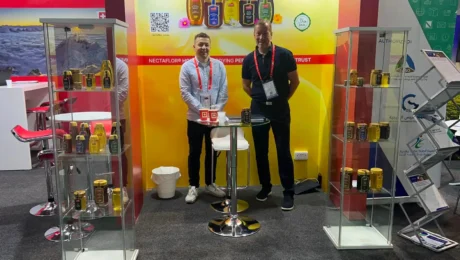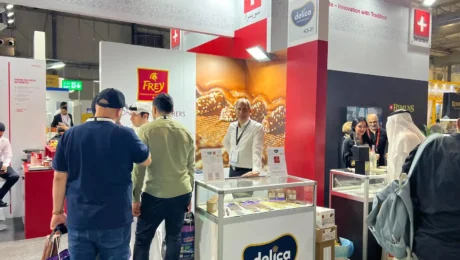UNIQVICTUS LLC is the Food Specialists representing various brands and companies in Asia.
Nectaflor Honey Makes Sweet Impression at Saudi Food Show, Paving the Way for Market Return
28 May 2024
The Saudi Food Show, the leading trade fair for buying and selling food and beverages in Saudi Arabia, took place from May 21st to 23rd, 2024, in Riyadh. This successful event brought together international sellers, industry leaders, and innovative brands. Our Nectaflor honey was showcased at the Swiss Pavilion by UNIQVICTUS LLC at the Swiss
- Published in News
Stefan Mai (Managing Director of UNIQVICTUS) and Lucas Gruenig (Marketing Director of Nectaflor) had three exciting days at the Saudi Food Show.
- Published in News
Nectaflor Participates in Swiss Pavilion, Great Opportunity for Swiss Companies in Saudi Arabia
28 May 2024
The Swiss Pavilion, organized by Swiss Global Enterprise (S-GE), provides Swiss companies with a great opportunity to enter the potential future market of Saudi Arabia.
- Published in News
We are delighted to announce that we will be taking over the distribution of Nectaflor products in the Middle East region starting on May 16th 2023.
- Published in News
Pollinators like bees are essential to 35% of crop production.
Foods including coffee, tomatoes and cocoa all depend on them.
40% of the world’s insect species are threatened with extinction.
- Published in News
Bees, the most important living being on the planet
01 October 2019
The world has lost 90% of its bees. Colombia is no exception, according to investigations of some groups annually disappear between 10 thousand and 16 thousand hives. With bill they try to save them.
- Published in News
Bees – including honey bees, bumblebees, and solitary bees – are very important because they pollinate food crops. Pollination is where insects move pollen from one plant to another, fertilising the plants so that they can produce fruit, vegetables, seeds and so on.
- Published in News
France will take a radical step towards protecting its dwindling bee population on Saturday by becoming the first country in Europe to ban all five pesticides researchers believe are killing off the insects.
- Published in News
negotiations on a free trade agreement between EFTA and Indonesia were concluded in substance, with Switzerland acting as lead negotiator.
- Published in News
Neonicotinoids, or neonics, will be banned for outdoor use in Europe thanks to environmental concerns. The European Union plans to ban the world’s most widely used insecticides in an effort to protect bees and other valuable pollinator insects.
- Published in News
- 1
- 2











